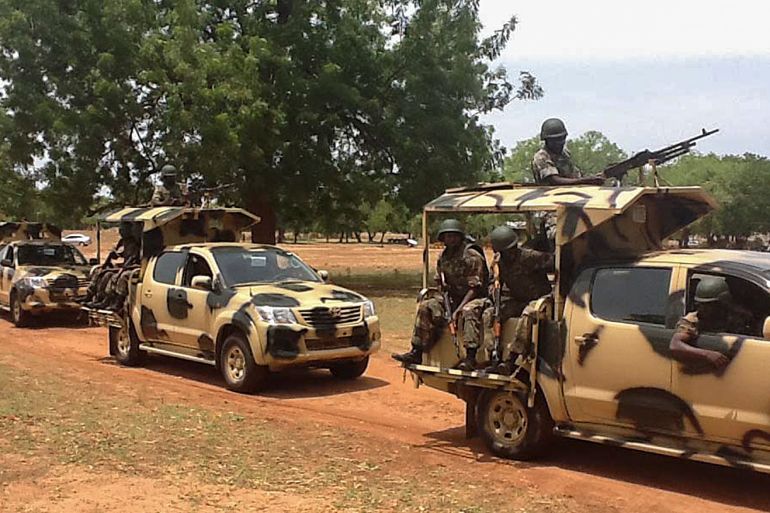Military wives protest Boko Haram deployment
Hundreds of wives protest in Maiduguri to block deployment of husbands, saying their spouses are ill-equipped.

Military wives in the restive Nigerian city of Maiduguri have taken to the streets this week, burning tyres to prevent their husbands’ deployment to fight Boko Haram.
About 300 women and 500 children have for two days gathered at the gates of a military base in the Borno state capital, claiming that their spouses were ill-equipped to take on the armed group.
Keep reading
list of 4 itemsTen years after Chibok girls kidnapping: One woman’s struggle to move on
Ten years after ‘Bring Back Our Girls,’ Nigeria’s kidnappings continue
Why mass kidnappings still plague Nigeria a decade after Chibok abductions
“No weapons for our husbands, no trip to Gwoza or any volatile place. We are tired of burying our loved ones,” Thabita John, one of the protesting wives, said on Monday.
She added that the soldiers were “ill-equipped to fight the dreaded Boko Haram”.
Another soldier’s wife, Rahina Ali, added: “Our husbands are always given inferior weapons while the Boko Haram have superior weapons.”
The military wives staged a similar protest on Saturday.
Boko Haram has been waging a brutal insurgency since 2009 which has left thousands of people dead, despite a state of emergency imposed in three northeast states since May 2013 and a troop surge.
The soldiers stationed in Maiduguri were due to retake the town of Gwoza, which Boko Haram overran last week, killing dozens and sending hundreds more fleeing.
Some survivors of the attack on Gwoza managed to make it to Maiduguri, some 135km away, but hundreds more were trapped on a nearby mountain and short on food.
No-go areas
President Goodluck Jonathan’s declaration of a state of emergency in Borno and neighbouring Yobe and Adamawa initially saw Boko Haram pushed out of urban centres.
But the thousands of extra troops, vehicles and aircraft have largely failed to stop militant attacks in remoter, rural areas. This year, attacks have occurred on an almost daily basis.
Locals claim that some parts of the northeast are effectively no-go areas for the military, with Boko Haram apparently better equipped than the soldiers sent to fight them.
Survivors of attacks frequently recount how the rebels used semi-automatic weapons, rocket-propelled grenades and even armoured personnel carriers.
One soldier who spoke on condition of anonymity said that the troops in the barracks in Maiduguri relied on run-down equipment.
“Our wives are speaking our minds… we are grossly under-equipped,” the soldier said. “Our guns are weak and armoured carriers not serviceable.”
A military spokesman in Maiduguri was not immediately available for comment.